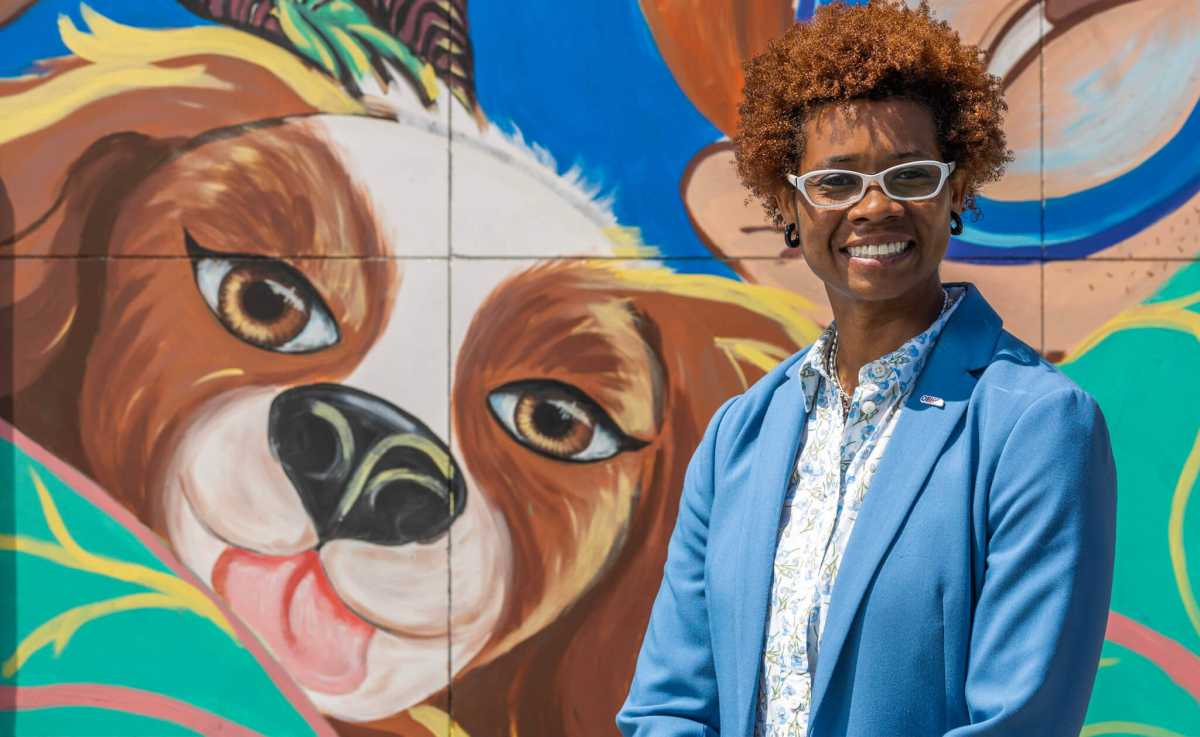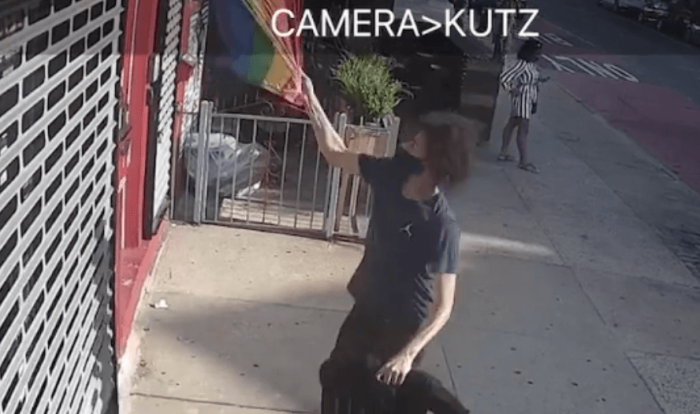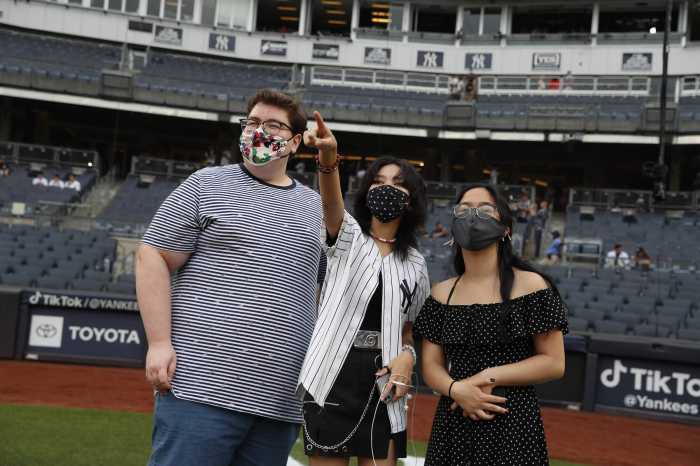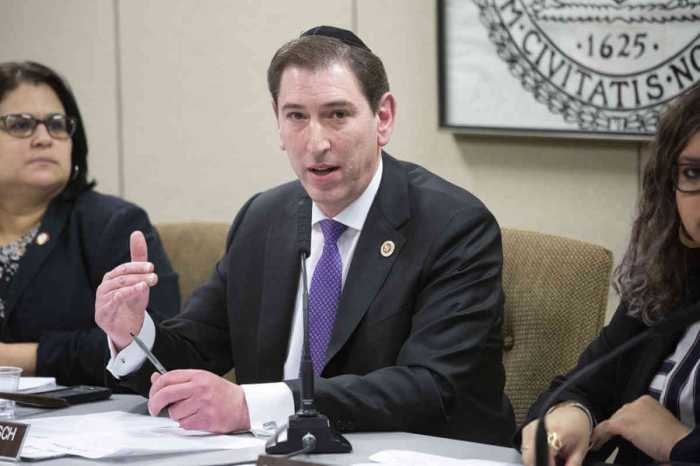Dr. Sandra Scott is excited about New York City Pride this year — and it’s not just because it’s the first full, in-person Pride celebration the city has held in two years since the pandemic hit. It’s because it marks her one-year anniversary to the day as executive director of Brookdale Hospital Medical Center. It’s also the first time ever the hospital is having a contingent marching in Sunday’s NYC Pride Parade.
Scott, a 55-year-old Black lesbian, is the first-ever out LGBTQ Black woman appointed to lead Brookdale Hospital Medical Center in the hospital’s 100-year history. Brookdale is a tertiary hospital within the One Brooklyn Health system.
“I’m just super excited,” Scott told Gay City News. “I’m excited that the organization has been able to embrace this movement, and that we’re going to participate. We’re going to show up and show out.”
Brookdale is a safety net hospital located in the Brownsville neighborhood of Brooklyn. The hospital’s patients are diverse, mostly from Black and brown communities, and there are many immigrants.
Scott, who has more than two decades of experience in emergency medicine and more than a decade of experience in hospital administration, stepped into the role of leading the hospital on June 26, 2021.
When she proposed to march in the NYC Pride Parade this year, the hospital’s staff responded enthusiastically.
“People were excited. People were interested. People wanted to bring their family members,” said Scott, who noted that about 50 hospital staff members are planning to march down Fifth Avenue from 26th Street to the festivities in Greenwich Village on June 26.
“It’s very important that the organization demonstrates that we embrace diversity, equity, and inclusion,” said Scott, who will join her staff marching with her partner in the parade. “Participating in the parade is one very outstanding way to do that, to show our community we hear you, we see you.”
For her, leading the hospital is a journey of “transforming the culture of the institution” to deliver a quality workplace environment to her staff and care to the community. She’s already achieving results and receiving accolades.
“I think it’s important to be a part of the change you want to see in the world,” she said about navigating racism and sexism. “You can’t fight every battle. You can’t punch back every time that happens.”
Scott takes the moment to teach the other person if she has the time. Otherwise, she doesn’t take it personally, choosing to keep pressing forward.
The one thing she said she didn’t think she experienced in her career was homophobia.
“I’m not saying it hasn’t happened. I’m just saying that I think these might be some rose-colored glasses or something,” she said, taking off her glasses and looking at them with a laugh.
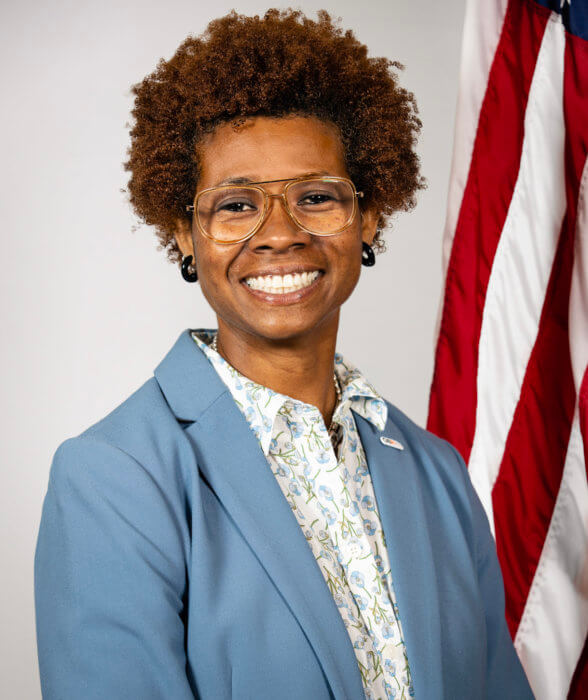
Since taking leadership at the hospital, Scott said, she’s watched the transformation in her staff and patients.
“I can see them and understand their experience and ways that don’t require as much translation,” she said.
“One of the most beautiful things is to walk through the hospital and have people come up to me and say, ‘You look just like my niece.’ ‘I have a friend who looks just like you,’” she said. What they are really saying, she explained, is, “I identify with you. You’re familiar to me.”
That brings her a sense of joy — and helped to keep her going during difficult times such as the early days of the COVID-19 pandemic when she served as chief of emergency medicine at Brookdale.
Scott, after all, is following a career path she always envisioned. She wanted to be a doctor since she was six years old watching ABC’s 1970s medical drama, “Marcus Welby, M.D.,” in the living room of her parents’ home in Baton Rouge, Louisiana, she said.
“As a little girl that just really resonated with me,” she said. “I was like, ‘I want to be like Marcus Welby.'”
The dream wasn’t out of reach for her or her sister, who is also a physician. They grew up in a southern Black household that valued education, from her grandparents to her parents. Her father was a mechanical engineer, and her mother was a college dean. They both were college professors at one point, said Scott, who explained that “intellectual confidence” has been the “backbone” that “has really afforded me the confidence to stand up and speak up.”
Scott received her undergraduate degree in biochemistry from Louisiana State University and then attended Baylor College of Medicine in Houston. She entered the newly emerging field of emergency medicine in the 1990s.
“Emergency medicine really appealed to me because there’s a lot of variety,” Said Scott, who left the south to begin her residency at Boston Medical Center. “I was really intrigued by … the energy. I love the people who work in emergency medicine, and I felt like that was a good fit for me and it was.”
Boston is also where Scott found a diverse LGBTQ community and fully came out.
“I had just started exploring the gay community in Houston,” when she moved North, she said. When she landed in Boston, she decided she was “just gonna be me here and explore my newfound identity. I never turned back.”
Scott thrived in the emergency room, where she enjoyed having “intense short relationships” with her patients.
“You meet someone. They’re in crisis. You gain their trust. You figure out to the best of your ability how to help them in the moment. You do that and you move on to the next patient,” she said.
In that role, she realized that her medical training and experience taught her how to face nearly any type of emergency.
Scott left Boston for New York and fit right in. She worked first as chief of service for emergency medicine at Rutgers New Jersey Medical School. Then she moved on, serving as chair of emergency medicine at Lincoln Medical Center before she became Brookdale’s chair of emergency medicine in 2018 before she was promoted to lead the emergency department and then settled into her current position.
Scott, who is the mother of a six-year-old boy, is using her platform to speak out on healthcare issues, such as Black women’s mortality during childbirth. Last year, she joined US Senator Charles Schumer, Congressmember Yvette Clarke, the Olori Sisterhood, and many of NYC’s leading Black women in health care and pushed for the passage of the Black Maternal Health ‘Momnibus’ Act in Build Back Better.
Aside from changing policies that direct services of healthcare to provide better care to marginalized communities, she said research is the best weapon LGBTQ people, especially BIPOC queer people, have to get quality health care. Search the internet, use apps such as InReach, and get recommendations from friends and family, she suggested
Earlier this year, she led the hospital’s community food drive for Martin Luther King, Jr. Day of Service.
Scott has been recognized for her leadership by the Make-A-Wish Foundation, which donated a mural to the children’s wing of the hospital last year. Most recently Schneps Media, Gay City News’ parent company, honored Scott along with 58 women at the Power Women of Brooklyn Awards in March.
“I’m mostly honored … and I feel really privileged,” Scott said about the accolades. “I’m just grateful that I have a nice big Afro, so all of that glass that’s come shattering doesn’t give me a headache.”

